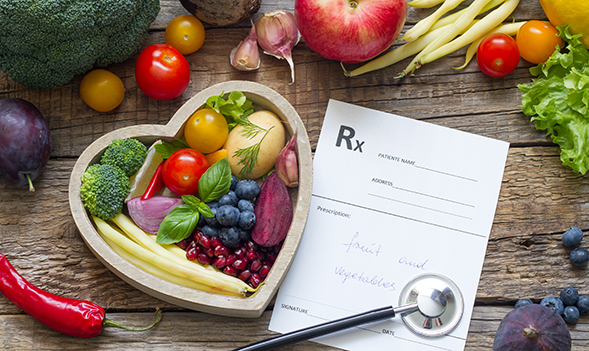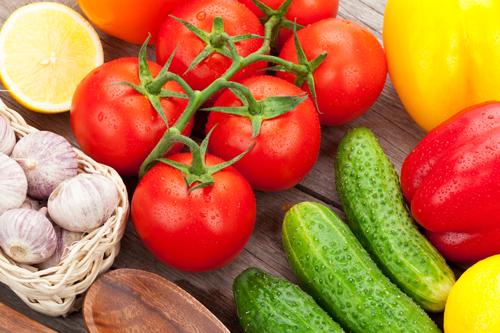Valentine’s Day isn’t the only special part of February. It’s also American Heart Month.
Have A Heart-to-Heart With Your Members This Month!
Posted by Rafael Cavour on Feb 16, 2022 11:00:00 AM
Topics: Home Delivered Meals, Heart Disease, Shopping for seniors
Food is Medicine for Managing Chronic Illness
Posted by Maureen Garner, MS, RD, LD on Jan 25, 2022 10:00:00 AM
Many homebound older adults do not receive adequate balanced meals, which are essential for managing chronic conditions such as diabetes and are vital for disease prevention. Unfortunately, proper nutrition and diet sometimes take a backseat to other steps in disease management. The body needs to receive the right balance of calories, vitamins, minerals, enzymes, fats, and proteins from food to function well. Food as medicine is not a new concept, but a good diet should be taken seriously and be a top goal to help ensure a better quality of life.
Topics: Nutrition, Heart Disease, Sodium, Healthy Home Delivered Meals, Post Discharge
Medically-Tailored Meals May Help Health Plans to Reduce Costs
Posted by John Siegel on Jun 25, 2020 11:15:00 AM
Topics: Home Delivered Meals, Heart Disease, Healthcare Cost Reduction, Food Insecurity, Older Adults, Medicare Advantage
(This post was originally published on February 15, 2018 and updated on July 10, 2019).
We all know that eating healthy can help to reduce your risk of heart disease-- and your waistline! But did you know that heart-healthy foods can be delicious? And it's easier than you may think!
Topics: Heart Disease, Healthy Meals for Seniors, Senior Nutrition
February is American Heart Month! It is an excellent time to take charge of your health. Regular visits to your doctor to check your blood pressure and cholesterol are simple ways to know your risk factors for heart disease. In fact, 80 percent of cardiovascular diseases may be preventable through education and action.
Topics: Nutrition, Home Delivered Meals, Heart Disease, Healthy Meals for Seniors, Senior Nutrition
Low Sodium Cooking Tricks for Flavorful Food
Posted by Michael Thrash, CEC, CCA, PCII and Levinia Clark, RD, LDN on Jan 13, 2016 10:00:00 AM
Low sodium meals don’t have to be flavorless! Thinking outside the salt shaker can yield some results that are both healthy and delicious. Here are a few little flavor boosters that are perfect for any low sodium diet, and for those looking to reduce their sodium intake.
Topics: Chronic Disease Management, Cardiac Diet, Heart Disease, Sodium
Cardiovascular disease is the leading cause of illness and death in the United States. The American Heart Association reports that a jaw-dropping 81.1 million American adults have at least one type of cardiovascular disease.
A diet high in saturated fat is a major risk factor for heart disease. Consuming a lot of saturated fat will elevate the body's cholesterol levels, cause cholesterol to accumulate in the arteries, and increases the chance of becoming obese due to the high caloric intake. While many people choose to follow a vegetarian diet due to cultural and religious beliefs, some choose a vegetarian diet to help restrict their intakes of saturated fats and cholesterol.
What are the advantages of a vegetarian diet?
Vegetarians have a reduced risk of cardiovascular disease, and have a lower body mass index and lower risk of obesity. Vegetarian diets have been associated with improved health outcomes. In fact, several clinical trials have documented that vegetarian eating patterns lower blood pressure. On average, vegetarians consume more fiber, potassium, and vitamin C than non-vegetarians do.
What does a balanced vegetarian diet look like?
A vegetarian does not eat any meat, fish, or poultry. A lacto-ovo vegetarian will include dairy prodcuts and eggs in his diet. Like all vegetarian's diets, the lacto-ovo diet includes an abundance of plant-based foods, including vegetables, fruits, beans, lentils, nuts, seeds, and whole grains, which provide an array of health-protective nutrients, such as fiber, vitamins, minerals, antioxidants, and phytonutrients.
A balanced lacto-ovo vegetarian diet should include six to eleven servings of whole grains, three to five servings of vegetables, two to four servings of fruit, three servings of dairy, and two to three servings of beans, nuts, and eggs. To make sure that you are meeting all of your nutrient needs, include a variety of foods from each group.
Topics: Chronic Disease Management, Vegetarian Meals, Cardiac Diet, Heart Disease
The Cold, Hard Truth About Heart Disease
Posted by Maureen Garner, MS, RD, LD on Jun 2, 2015 11:00:00 AM
According to the American Heart Association, or AHA, cardiovascular disease is the leading cause of illness and death in the United States. In fact, the AHA reports that an astounding 81.1 million American adults have at least one type of cardiovascular disease, which includes people with coronary heart disease, high blood pressure, heart failure, stroke, and congenital heart defects.
Topics: Chronic Disease Management, Cardiac Diet, Heart Disease












